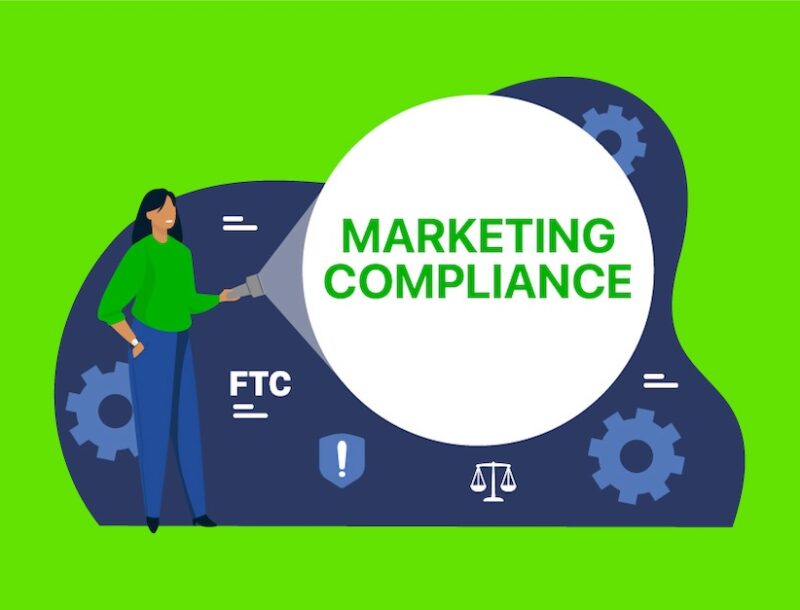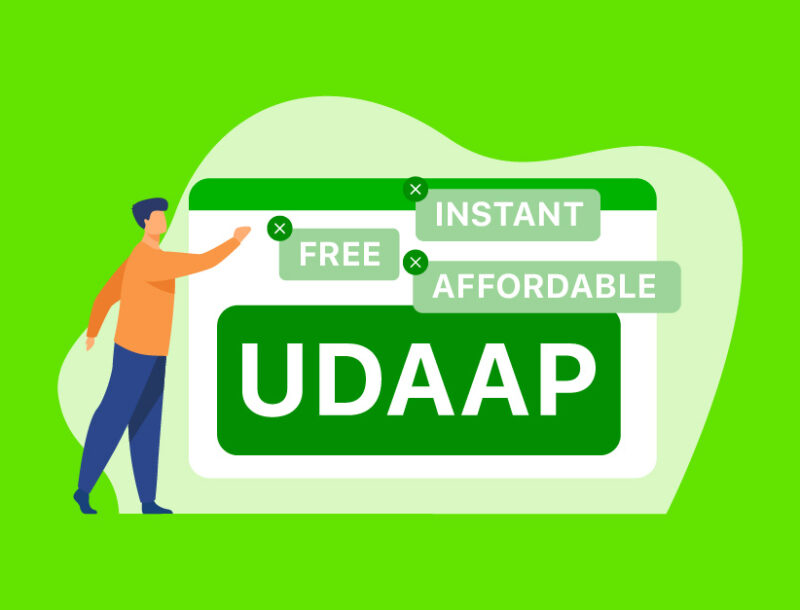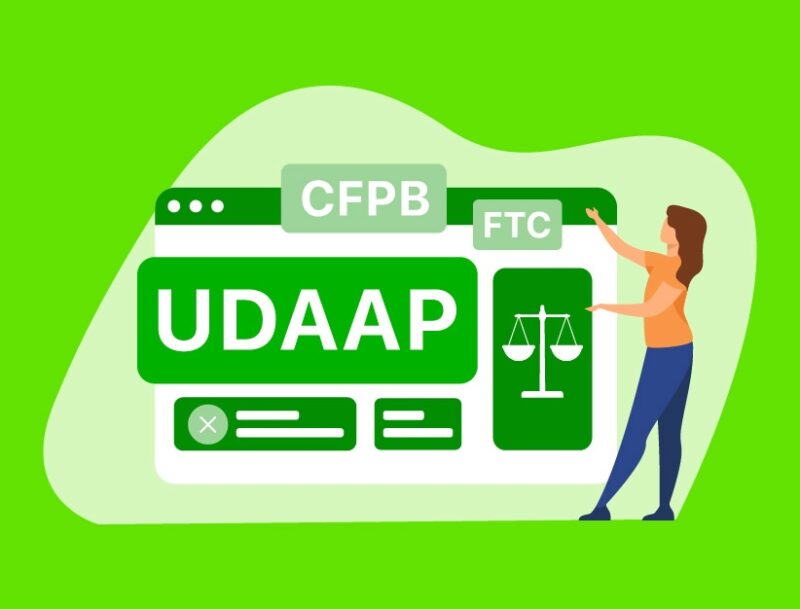Episode 15: BNPL Market Trends and Consumer Impacts Pt. 2

Episode Description:
Our COMPLY Podcast episode this week is part two of a conversation on the current and future regulation of the buy now, pay later industry featuring Alan Kaplinsky and Lisa Lanham, two thought leaders from Ballard Spahr, and PerformLine’s own SVP John Zanzarella.
Their conversation focuses on the CFPB’s latest report on Buy Now, Pay Later: Market trends and consumer impacts, as they specifically discuss the three main areas of concern for consumer protection risks for BNPL products as outlined by the CFPB, from both the federal and state perspective, including the lack of standardized disclosures for these products, the lack of process around dispute resolution, and the issue of compulsory payments, or “auto-pay” as the bureau refers to it.
Show Notes:
- The Buy Now, Pay Later Compliance Checklist: https://bit.ly/3EWze5e
- Top 5 Buy Now, Pay Later Compliance Issues Across Merchant Sites: https://bit.ly/3B40P37
- The Buy Now Pay Later International Regulation Map: https://bit.ly/3VncMZS
- Follow Alan: https://www.linkedin.com/in/alankaplinsky/
- Follow Lisa: https://www.linkedin.com/in/lisamlanham/
- Follow John: https://www.linkedin.com/in/johnzanzarella/
- Follow Ashley (AC): https://www.linkedin.com/in/ashley-cianci
Subscribe to COMPLY: The Marketing Compliance Podcast
About COMPLY: The Marketing Compliance Podcast
The state of marketing compliance and regulation is evolving faster than ever, especially for those in the consumer finance space. On the COMPLY podcast, we sit down with the biggest names in marketing, compliance, regulations, and innovation as they share their playbooks to help you take your compliance practice to the next level.
Episode Transcript:
Ashley:
Hey there COMPLY podcast listeners! Our episode this week is part two of a conversation on the current and future regulation of the buy now, pay later industry featurig Alan Kaplinsky and Lisa Lanham two thought leaders from Ballard Spahr and PerformLine’s own SVP, John Zanzarella.
If you haven’t listened yet, I would suggest you go back and listen to our previous podcast episode that has part one of this conversation where they discuss where this industry stands today and the possible future of this industry over the next few years given the current headwinds it faces – including a decrease in consumer spending, rising inflation and existing loan quality and cost of funding becoming constrained as interest rates continue to rise.
Today’s conversation however is much more focused on the CFPB’s latest report on Buy Now, Pay Later: Market trends and consumer impacts. During today’s episode they discuss the three main areas of concern for consumer protection risks for BNPL products as outlined by the CFPB, from both the federal and state perspective. These consumer risks include the lack of standardized disclosures for these products, the lack of process around dispute resolution, and the issue of compulsory payments or “auto-pay” as the Bureau refers to it.
Thanks for listening and enjoy the show!
John:
So let’s dig into the consumer protection issues that came up in the report. The report in December of this year came out, I’m sorry, the report was started shortly after Director Chopra, took office in December of 2021. The report was looking at the top five buy now, pay later companies. I think one of the goals of the inquiry was to really just illuminate the range of these consumer credit products and their underlying business practices. Until then we had not had a lot of information about data around buy now, pay later. And the Bureau specifically called out three main areas, which I’d like to dig into now. The first one with regards to consumer protection risk was around discrete consumer harms. Second was data harvesting, and third was overextension, at least for me, not three terms that were kind of commonly used. And so I would love it if we just started with the first one. Talk to us about discreet consumer harms, what they’re referring to, and you know, how you’re advising companies to act with that.
Alan:
Alright, I guess I’ll start again and then let Lisa fill in from her perspective. So the, one of the main things that really is getting under the skin of Rohit Chopra is the fact that there aren’t any standardized disclosures for buy now, pay later, at least at the federal level. Lisa will let you know in a second, what some of the state law requirements may be in the disclosure area. And because throughout the report, it’s made clear by the CFPB that the lack of standardized disclosures may obscure the true nature of the product as a credit product and make important information about loan terms, including such things, things as when, and how fees are assessed and when payments are due, less accessible to the consumer and therefore more difficult to do comparison shopping.
Alan:
And the thing that this industry is constantly being compared to by the CFPB is the credit card industry. In the credit card industry, there are all kinds of disclosures that are required both for closed end credit, which is generally what the buy now, pay later product is. You have to have a so-called what they call the Schumer box that discloses the amount financed the total of payments the number of payments that are being made, are there finance charges, what’s the annual percentage rate, are there late fees associated with it? And then the CARD act, which applies to credit cards, layers on top of that all time types of substantive requirements, which we will get into a bit later. The one thing I guess, observation I would make is that there were no comments made in this section of the report, which is the latter part of the report where they talk about, the consumer harms, no mention of the fact that they would like to see payment reminders given to consumers, even though, that was a big part of the market monitoring order that got issued where they asked the five companies for information.
Alan:
Well, anyway, I l why don’t we pause on disclosure and I’ll let Lisa add her 2 cents, and then we’ll turn to the other two things that they talked about.
Lisa:
Yeah, sounds good. Yeah. With respect to disclosures specifically, there’s already a lot of state laws and regulations around disclosures for consumer finance products. I think the issue that the states are really struggling with right now is, what box do, to your point, Alan, what box do we put this in? Because we’ve got all the disclosure requirements that we could possibly need. We just need to know where it is that we put you first. Right? But like, something that I thought was really interesting when I read through the CFPB’s report is, and I wanted to flag it for the listeners, right? There’s actually a footnote in the report that cites to a letter written by the attorneys general of about 20 different states to the CFPB in support of its inquiry. And it’s, for me, like that was almost just as important as the CFPB report itself.
Lisa:
So after praising the CFPB for its inquiry and taking, quote unquote, the first step towards greater transparency and regulation of the industry, the state AGs go on to make several comments about the types of discreet consumer harms that they’re concerned about, right? So some of these quotes are, while we encourage access to safe and affordable credit, we have concerns about new and supposedly innovative financial products that promise to disrupt and democratize the industry, but push consumers into cycles of debt and carry some of the same terms and features as other expensive and predatory financial products. We are particularly concerned when such products are popular among younger consumers, unfamiliar with navigating credit products and consumers who already may be struggling to make ends meet and to cover their existing debt burdens, right? They’re concerned about quick application approvals, no credit checks, no interest or fees, convenient payment schedules, all of which might be masking features that contribute to long-term damage to consumers financial health.
Lisa:
They also promised to use all resources at their disposal to ensure that the citizens of their states are protected from the potential harms of new financial products. And one thing actually that the states brought up in their letter that didn’t come up in the report that, that I thought was, you know, interesting, I had never considered it before. They were concerned about apparent emerging relationships between BNPL providers and for-profit schools. So like now we’re, you know, student loan servicing and all of that’s a very hot topic among the states right now, and it seems like we’re sort of wrapping that up with the BNPL product. They call out an online boot camps and credentialing programs as two potential education programs that they’re making sure to look at. So in their letter, the state AGs are expressly urging the CFPB to do, I mean, a lot of things I could spend five minutes just listing through it all. But really it’s just about, you know, making sure that on the CFPB is fully appreciating what’s going on with these discreet consumer harms. Like we’ll get into dark patterning and credit reporting and underwriting policies and making sure that, you know, the CFPB is holding these providers speak to the fire, in making sure that they’re actually doing what they should be doing to protect consumers.
Alan:
Right? So, why don’t we turn, John, if it’s okay with you, to the area of dispute resolution, because that was the second disclosures was the first thing, then dispute resolution. And that’s another area that CFPB is very concerned about and they go out of their way to contrast the how disputes are resolved in the BNPL industry with how they’re done in the credit card industry. And under Regulation Z and the Truth and Lending Act, there are protections against unauthorized use. There’s a right of a card holder to assert claims or defenses against the issuer. There’s section dealing with crediting of merchant refunds. There’s billing error resolution rules, and in the BNPL industry, unless Lisa tells us there’s some things under state law, which there might be, there’s nothing at the federal level that applies, because it’s not a credit card product and it’s not open end credit.
Alan:
And, it’s not subject to closed end disclosure rules because generally there’s no interest charged on the transaction and, it’s payable and fewer than four installments. So, that’s a real problem. And the thing they identified in that they don’t like is that consumers, if they’ve got a problem with the merchant, they are going to have to continue to pay their whatever monthly payment is due before the dispute with the merchant gets resolved. And that’s not how it works in the credit card industry. Credit card industry until there’s been an investigation by the credit card issuer of the dispute, your obligation to make payments is absolutely put on hold. So that’s the issue at the federal level. Lisa?
Lisa:
Yeah, on the state level too, I think it gets back to what it was that I was saying before. Like there’s just still no sort of box that we can put this in. And there’s definitely some things about BNPL specifically that might never fit perfectly into a credit card box or a consumer loan box, or a sales finance box, right? So the state AGs in their letter also brought up issues with dispute resolution, right? Like reading it right now, they’re saying, you know, consumers may continue to be on the hook to repay their loans even if they purchased faulty merchandise or merchandise from a scam company. And it is a real concern. So the state AGs in their letter, one of the things that they expressly urged the CFPB to do was, review the dispute resolutions and procedures and protections offered by BNPL providers ensure that they implement rigorous oversight policies immediately take action to cancel, they’re calling them loans associated with defective or return merchandise or purchase through scam merchants and end relationships with unscrupulous merchants. So it’s and they also in all of that, right, like in that directive, they are acknowledging that there are a lot of consumer protections available to folks that are using a credit card or like going with a more traditional product, and they wanna make sure that if this product is gonna be offered that this is managed in the right way, that’s beneficial to consumers.
Alan:
Yeah. The third area that they identify is the issue of compulsory payments or as it’s referred to in the report, autopay. And that is, there is a requirement, from every BNPL issuer that the monthly or the biweekly payments are paid automatically, either through a debit card, through a credit card, ACH prepaid card, payment by check, doesn’t really happen very often, if at all. They, the companies get around the compulsory use authorization, because not every one of these methods of payments that I enumerated are considered to be electronic fund transfers. So if the, if you say to the consumer, you know, you can pay through a credit card, a debit card, or you can do it through ACH, which is an EFT, , that’s generally considered compliance with that compulsory use situation.
Alan:
Well Director Chopra doesn’t say what the companies are doing is illegal, but he doesn’t like it. Okay? He wishes it was illegal and he identifies it. The other areas represent he doesn’t like the fact that a number of buy now, pay later companies if the consumer doesn’t pay, you know, signs up for ACH and then discontinues it and stops it. And, and there’s no payment made they many companies will represent the item and they, some will represent it twice, three times. And they mention in the report, there’s, some companies have represented it as much as eight times, and that will often lead to additional fees being paid by the consumer to the entity that is being used to make the payments, which typically another bank is involved.
Alan:
So they don’t like that. And they talk about hidden interest, not really sure what they mean by that. I think part of their concern is that a number of people, customers pay with a credit card and credit cards, and they pay interest on the credit cards, and there are finance charges. And, you know, and that creates an issue for the CFPB because if you’re advertising absolutely no interest is payable interest free, well, that may not be true and probably is not true. If the customer is using a credit card, it’s interest is accruing to the credit card issuer. It’s not going to the buy now, pay later company, except perhaps in terms of sharing the interchange fee. So it’s an area that you have to tread very carefully in terms of, you know, making sure that your disclosures are plum perfect, Lisa?
Lisa:
Yeah, and I would say on the state level too there’s certain things that that AG letter did not address, as, you know, intensely, if you will, as the CFPB report did, like ACH and representment, like, it’s not as much in that letter fees are certainly in their disclosures are certainly in there. They wanna make sure that consumers really understand what it is that they’re getting themselves into, right? But there have been other state actions outside legislative or otherwise outside of this report.And the letter from the state AGs where they’ve talked about unscrupulous debt collection practices. We have an amendment to a DC debt collection law right now that gets to original creditors and has a really interesting definition of that., we have a Maryland advisory opinion talking about convenience fees and things that they’re making sure to protect their consumers on.
Lisa:
So just because it’s not addressed necessarily in the AGs letter doesn’t mean that it’s not on the state’s radar. I think I always like to tell people that the states, I think, look to the CFPB as sort of like its lighthouse and what’s important to the CFPB is going to be important to your state. So it’s always very important to hear what’s coming out of there, and then think about how this could impact you on a state level, because you always have to think about your business in a regulated industry as you know, what are my federal compliance obligations and what are my state compliance obligations? And oftentimes with these more unique products that we’re dealing with, a, a factor that has to go into this is how are state regulators not just like, not just what do the laws and the regulations say, but how are state regulators using their enforcement powers or the AGs like going after people with civil litigation actions, like what’s happening there for you to make an informed decision, because that’s now your risk-based assessment, when figuring out what your, what your plan is for going into any particular state.
Alan:
The final thing under this category and then I’ll, we’ll turn it back after Lisa and I comment on this to you, John, are late fees. That is an important source of income to buy now, pay later companies. The late fees generally have not been that high as a percentage. They said in 2021, about 12% of borrowers were charged at least one late fee. And late fees were charged as 7% of all loans and 57% of late fee charges were collected. The thing that bothers the CFPB here is that under the CARD Act that applies to credit cards, late fees have to be reasonable and proportional. And under regulations issued by the CFPB that several years ago, the CFPB designated what the maximum late fee could be, it provided for a safe harbor that if you charged no more than a certain amount, you would be deemed to have complied with the reasonable and proportional requirement.
Alan:
There is no reasonable and proportional requirement as a matter of federal law, that differs under state laws, Lisa will tell you in a minute. The other thing that is problematic in the late fee area is there’s some BNPL issuers or lenders that will charge more than one late fee per miss payment. They don’t like that and that’s not allowed in the credit card area either at the federal level and let me conclude this segment by just quoting, Director Chopra, what he had us say about the things we’ve talked about, put simply buy now, pay later can be compared to a credit card that incorporates infomercial style payment plans. And I’ve asked our staff to identify potential interpretive guidance or rules to issue with the goal of ensuring that buy now, pay later firms adhere to many of the baseline protections that Congress has already established for credit cards. That’s, you know, I guess the bottom line, but Lisa, at the state law level, there are restrictions on late fees, right?
Lisa:
Yeah. I mean, there’s restrictions on late fees. There’s user limitations in general, you know, something that we’ve been noticing more on the state level, I guess is, you know, when people used to come to me about the, this is the product that I’m offering, right? It’s zero interest, and that knocks you out in a lot of states from needing a license, not charging an interest rate, or having what you know, would traditionally be deemed a finance charge would knock you out of needing to be regulated in a number of states. So that was a licensing decision, right? More recently we’ve started noticing people coming to us with these products where that was the licensing determination. And states are coming to them and saying, you know what, actually we are recharacterizing a lot of these things. We’re considering this to be a finance charge.
Lisa:
And we’re considering this to be interest and we have a criminal user limitation, your $2 a month payment, or whatever it is that you have to give for, you know, for your installments, now look usurious, right? So it’s hard to wrap your mind around the fact that these small payments could be considered to be usurious by a state. But I think that’s what I’m trying to get at with some of our other comments too, is that there are these existing frameworks out there, and our states will leverage those existing frameworks to, and use them to enforce or protect their consumers to the largest extent possible. And there’s, the way that some of these laws and regulations are drafted, it really does give some room for broad interpretation of certain terms and give some broad authority to your state regulators. So it’s a very much, you have to analyze what states are doing and where states are at in terms of their own thinking of certain products or analogous products before you step into some sort of a regulated industry.
Alan:
One other thing I wanna alert people to, and I just became sensitive to this, the other day when I was reading about a new California Court of Appeals opinion, that it didn’t deal with buy now, pay later, and in fact, it was a business loan. But in several states, there is a common law doctrine, not statutory, but common law, that you cannot charge a penalty to somebody for breaching their contract. You can charge what’s called liquidated damages, okay? But the liquidated damages, whatever that is, that means like the late fee of a fixed amount that’s gotta be, a representative of, or approximate, what is the cost to the lender. Because of the breach of contract by the consumer. And so in addition, in some states, particularly if you’re in a state that doesn’t seem to license or regulate by now, pay later lenders, you do have to nevertheless worry about this common law doctrine, that applies to late fees. And that’s often overlooked, you know, by a number of people.
Ashley:
Thanks for listening to this episode of the COMPLY podcast!
As you can tell from this podcast discussion and the attention this industry is getting from regulatory agencies, there are likely going to be several iterations the buy now, pay later product offering, and you’re not going to be as competitive in this space if you’re not being proactive in compliance. PerformLine has been and will continue to be diligent in our understanding of this space as it pertains to monitoring and compliance. We have a few content pieces that I’ll link in today’s show notes including a Buy Now, Pay Later Compliance Checklist and an International Regulation Map for Buy Now, Pay Later Lenders.
For that and the other content mentioned during today’s episode, be sure to check out today’s show notes and as always for the latest content on all things marketing compliance you can head to content.performline.com.
Thanks again for listening and we’ll see you next time!


